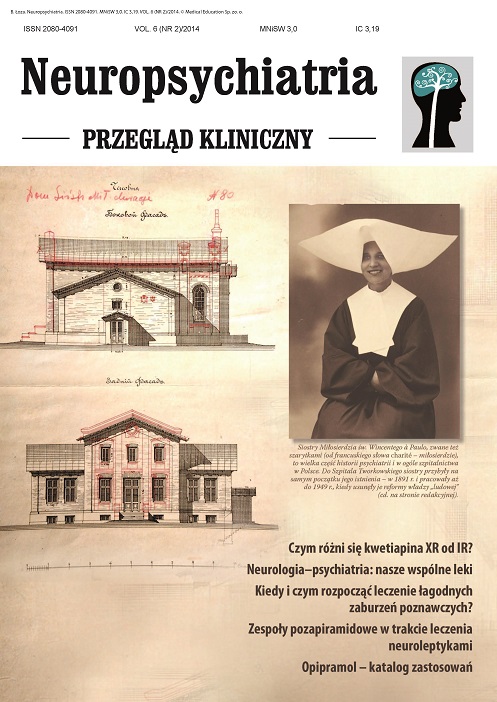Łagodne zaburzenia poznawcze: czym są i jak je leczyć? Artykuł przeglądowy
##plugins.themes.bootstrap3.article.main##
Abstrakt
Łagodne zaburzenia funkcji poznawczych są zespołem heterogennym. 30% z nich ulegnie konwersji do otępienia, część utrzyma się na stabilnym poziomie, a niektóre ulegną poprawie.
W artykule zwrócono uwagę na kluczową rolę diagnostyki, która pozwala wykryć odwracalne przyczyny MCI, jak również pozwala przewidzieć, u których chorych nastąpi konwersja do otępienia. Nie ma oczywistych standardów farmakoterapii. W artykule omówiono leki takie jak donepezil, nicergolina czy Ginkgo biloba, które mogą mieć terapeutyczne działanie w MCI.
##plugins.themes.bootstrap3.article.details##

Utwór dostępny jest na licencji Creative Commons Uznanie autorstwa – Użycie niekomercyjne – Bez utworów zależnych 4.0 Międzynarodowe.
Copyright: © Medical Education sp. z o.o. License allowing third parties to copy and redistribute the material in any medium or format and to remix, transform, and build upon the material, provided the original work is properly cited and states its license.
Address reprint requests to: Medical Education, Marcin Kuźma (marcin.kuzma@mededu.pl)
Bibliografia
2. Talarowska M, Florkowski A, Zboralski K, Gałecki P. Skala MoCA i MMSE w diagnozie łagodnych zaburzeń poznawczych. Psychiatria i Psychoterapia 2011; 7(1): 13-20.
3. Sadock B.J., Sadock V.A., Ruiz P.: Comprehensive textbook of psychiatry, Lippincott Williams & Wilkins 2009.
4. American Psychiatric Association, Diagnostic and statistical manual of mental disorder, fifth edition, American Psychiatric Publishing, Washington 2013; 605.
5. Petersen RC, Smith GE, Waring SC, Ivnik RJ, Tangalos EG, Kokmen E. Mild cognitive impairment: clinical characterization and outcome. Arch Neurol 1999; 56(3): 303-308.
6. Lee JY, Dong Woo L, Cho SJ, Na DL, Hong Jin Jeon, Kim SK, You Ra Lee, Youn JH, Kwon M, Lee JH, Maeng JC. Brief screening for mild cognitive impairment in elderly outpatient clinic: validation of the Korean version of the Montreal Cognitive Assessment. J Geriatr Psychiatry Neurol 2008; 21: 104-110.
7. Nasreddine ZS, Phillips NA, Bedirian V, Charbonneau S, Whitehead V, Collin I, Cummings JL, Chertkow H. The Montreal Cognitive Assessment, MoCA: a briefscreening tool for mild cognitive impairment. J Am Geriatr Soc 2005; 53: 695-699.
8. Bednarski P, Łoza B, Patejuk-Mazurek I, Polikowska M. Dysfunkcje neuropsychologiczne – implikacje dla leczenia MCI i AD. Neuropsychiatria 2010; 2(2): 53-60.
9. Leszek J. Choroby otępienne. Teoria i praktyka. Continuo, Wrocław 2011; 321-330.
10. Reischies FM, Hellweg R. Prediction of deterioration in mild cognitive disorder in old age- neuropsychological and neurochemical parameters of dementia diseases. Compr. Psychiatry 2000; 41: 66-75.
11. Gabryelewicz T. Management of mild cognitive disorders. Aktualn. Neurol. 2004; 4: 167-170.
12. Cassels C. Simple Eye Tests to Detect Alzheimer’s Disease in the Works, Medscape Medical News, Conference News 2014.
13. Jeffrey S. Loss of Smell Linked to Brain Abnormality, Transition to AD, Medscape Medical News, Conference News 2014.
14. Sobów T. Praktyczna psychogeriatria, wyd. Continuo 2010: 145.
15. Birks J, Flicker L. Donepezil for mild cognitive impairment. Cochrane Database Syst Rev 2006; 3: doi: 10.1002/14651858.
16. Vetulani J. Nicergolina – stary lek z nowymi perspektywami. Neuropsychiatria 2014; 6(1): 49-59.
17. Ihl R, Bachinskaya N, Korczyn AD, Vakhapova V, Tribanek M, Hoerr R, Napryeyenko O. Efficacy and safety of a once-daily formulation of Ginkgo biloba extract EGb 761 in dementia with neuropsychiatric features: a randomized controlled trial. Int J Geriatr Psychiatry 2011; 26(11): 1186-1194.
18. Gavrilova S, Preuss UW, Wong JW, Hoerr R, Kaschel R, Bachinskaya N. Efficacy and safety of Ginkgo biloba extract EGb 761 in mild cognitive impairment with neuropsychiatric symptoms: a randomized, placebo-controlled, double-blind, multicenter trial. Int J Geriatr Psychiatry 2014; Mar 16.
19. Flicker L, Grimley Evans J. Piracetam for dementia or cognitive impairment (review), the Cochrane collaboration, 2012.
20. Szatmári S, Whitehouse P. Vinpocetine for cognitive impairment and dementia, Cochrane Dementia and Cognitive Improvement Group, online: 20.01.2003.
21. Janusz M, Zabłocka A. Colostrinin: a proline-rich polypeptide complex of potential therapeutic interest. Cell Mol Biol 2013; 59(1): 4-11.

